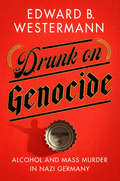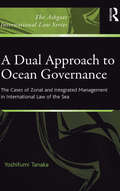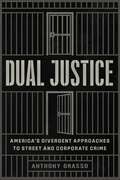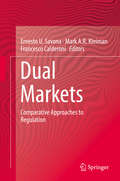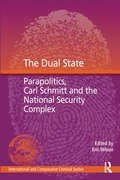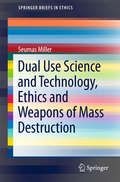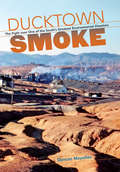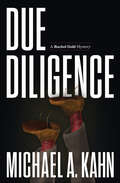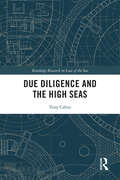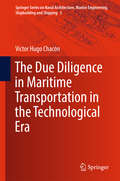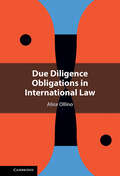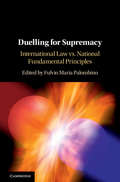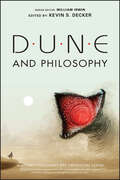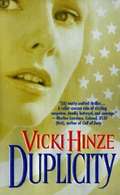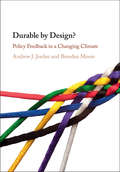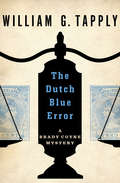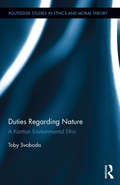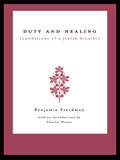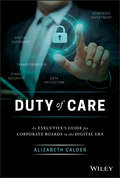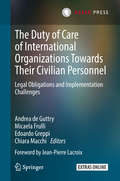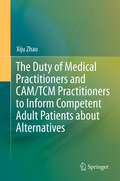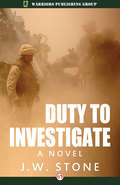- Table View
- List View
Drunk on Genocide: Alcohol and Mass Murder in Nazi Germany (Battlegrounds: Cornell Studies in Military History)
by Edward B. WestermannIn Drunk on Genocide, Edward B. Westermann reveals how, over the course of the Third Reich, scenes involving alcohol consumption and revelry among the SS and police became a routine part of rituals of humiliation in the camps, ghettos, and killing fields of Eastern Europe. Westermann draws on a vast range of newly unearthed material to explore how alcohol consumption served as a literal and metaphorical lubricant for mass murder. It facilitated "performative masculinity," expressly linked to physical or sexual violence. Such inebriated exhibitions extended from meetings of top Nazi officials to the rank and file, celebrating at the grave sites of their victims. Westermann argues that, contrary to the common misconception of the SS and police as stone-cold killers, they were, in fact, intoxicated with the act of murder itself. Drunk on Genocide highlights the intersections of masculinity, drinking ritual, sexual violence, and mass murder to expose the role of alcohol and celebratory ritual in the Nazi genocide of European Jews. Its surprising and disturbing findings offer a new perspective on the mindset, motivation, and mentality of killers as they prepared for, and participated in, mass extermination.Published in Association with the US Holocaust Memorial Museum.
A Dual Approach to Ocean Governance: The Cases of Zonal and Integrated Management in International Law of the Sea (The Ashgate International Law Series)
by Yoshifumi TanakaTaking the North-East Atlantic Ocean as an example of regional practice, this book addresses the dual approach to ocean governance in international law. It examines the interaction between zonal and integrated management approaches and the conservation of marine living resources and marine biological diversity. The study examines the limitations of the traditional zonal approach and suggests new possibilities for conformity between sovereign states, international law and sustainable development.
Dual Justice: America’s Divergent Approaches to Street and Corporate Crime (Chicago Series in Law and Society)
by Anthony GrassoA far-reaching examination of how America came to treat street and corporate crime so differently. While America incarcerates its most marginalized citizens at an unparalleled rate, the nation has never developed the capacity to consistently prosecute corporate wrongdoing. Dual Justice unearths the intertwined histories of these two phenomena and reveals that they constitute more than just modern hypocrisy. By examining the carceral and regulatory states’ evolutions from 1870 through today, Anthony Grasso shows that America’s divergent approaches to street and corporate crime share common, self-reinforcing origins. During the Progressive Era, scholars and lawmakers championed naturalized theories of human difference to justify instituting punitive measures for poor offenders and regulatory controls for corporate lawbreakers. These ideas laid the foundation for dual justice systems: criminal justice institutions harshly governing street crime and regulatory institutions governing corporate misconduct. Since then, criminal justice and regulatory institutions have developed in tandem to reinforce politically constructed understandings about who counts as a criminal. Grasso analyzes the intellectual history, policy debates, and state and federal institutional reforms that consolidated these ideas, along with their racial and class biases, into America’s legal system.
Dual Markets
by Ernesto U. Savona Mark A.R. Kleiman Francesco CalderoniThis comprehensive volume analyzes dual markets for regulated substances and services, and aims to provide a framework for their effective regulation. A "dual market" refers to the existence of both a legal and an illegal market for a regulated product or service (for example, prescription drugs). These regulations exist in various countries for a mix of public health, historical, political and cultural reasons. Allowing the legal market to thrive, while trying to eliminate the illegal market, provides a unique challenge for governments and law enforcement. Broken down into nine main sections, the book studies comparative international policies for regulating these "dual markets" from a historical, legal, and cultural perspective. It includes an analysis of the markets for psychoactive substances that are illegal in most countries (such as marijuana, cocaine, opiods and amphetimines), psychoactive substances which are legal in most countries and where consumption is widespread (such as alcohol and tobacco), and services that are generally regulated or illegal (such as sports betting, the sex trade, and gambling). For each of these nine types of markets, contributions focus on the relationship between regulation, the emerging illegal market, and the resulting overall access to these services. This work aims to provide a comprehensive framework from a historical, cultural, and comparative international perspective. It will be of interest to researchers in criminology and criminal justice, particularly with an interest in organized crime, as well as related fields such as sociology, public policy, international relations, and public health.
The Dual State: Parapolitics, Carl Schmitt and the National Security Complex (International and Comparative Criminal Justice)
by Eric WilsonThis volume presents a practical demonstration of the relevance of Carl Schmitt's thought to parapolitical studies, arguing that his constitutional theory is the one best suited to investing the ’deep state’ with intellectual and doctrinal coherence. Critiquing Schmitt’s work from a variety of intellectual perspectives, the chapters discuss current parapolitical reality within the domain of criminology, the parapolitical nature of both the dual state and the national security state corporate complex. Using the USA as a prime example of the world’s current dual or ’deep political state’, the criminogenic dimensions of the parapolitical systems of post 9/11 America are discussed. Using case studies, the dual state is examined as the causal factor of inexplicable parapolitical events within both the developed and developing world, including Sweden, Canada, Italy, Turkey, and Africa.
Dual Use Science and Technology, Ethics and Weapons of Mass Destruction (Springerbriefs In Ethics Ser.)
by Seumas MillerThis book deals with the problem of dual-use science research and technology. It first explains the concept of dual use and then offers analyses of collective knowledge and collective ignorance. It goes on to present a theory of collective responsibility, followed by four chapters focusing on a particular scientific field or industry of dual use concern: the chemical industry, the nuclear industry, cyber-technology and the biological sciences. The problem of dual-use science research and technology arises because such research and technology has the potential to be used for great evil as well as for great good. On the one hand, knowledge is a necessary condition, and perhaps a constitutive feature, of technologies that contribute greatly to individual and collective well-being. Consider, for example, nuclear technology that enables the generation of low cost electricity in populations without obvious alternative energy sources. So technological knowledge is a good thing and ignorance of it a bad thing. On the other hand, these same technologies can be extremely harmful to individuals and collectives, as with the atomic bombs dropped on Hiroshima and Nagasaki. So, at least with respect to some technologies evidently knowledge is a bad thing and ignorance a good thing. Accordingly, the question arises as to whether we ought to limit scientific research and/or the development of technology and, if so, which research or technology, in what manner and to what extent. This book examines the answer to that question.
Duarte, el priista perfecto
by Arturo Ángel«El sexenio de Duarte es un gran ejemplo de la forma en que opera el sistema político mexicano. Duarte no es una anormalidad, sino un caso más» Daniel Moreno / Del Prólogo Javier Duarte encarna la definición de «político corrupto»: saqueó las arcas públicas, robó miles de millones de pesos, creó una red para ocultar sus delitos, alimentó los compadrazgos, despreció la ley y ultrajó al pueblo que gobernaba. Pero el veracruzano no es un caso aislado... El exgobernador pudo perpetrar sus transas gracias a que fue protegido por sus compañeros priistas: su «logro» fue llevar a un nivel delirante usos y costumbres de sus correligionarios. Duarte: el priista perfecto documenta a detalle la vida del hombre que Enrique Peña Nieto presumió como ejemplo de «la nueva generación» del PRI. Con un ritmo trepidante, el reportero Arturo Ángel reconstruye la historia del exmandatario, desde su infancia de pobreza en Córdoba hasta sus cenas de 300 mil pesos en Veracruz, desde su meteórico ascenso en los pasillos del poder en Xalapa hasta su derrumbe en los calabozos de Guatemala. El periodista -coautor de la investigación que llevó a la captura de Duarte- explica el sistema empleado para desfalcar a todo un estado, da nombres y apellidos de los cómplices del político y ofrece una legión de datos acerca de la cleptómanía del priista y sus protectores. Finalmente, Arturo Ángel lanza la alerta: el esquema de robo usado por el exgobernador sigue vivo y se expande. A fin de cuentas, si Duarte robó, lo hizo también para financiar campañas políticas; las redes de impunidad que creó ya operan en otros estados, sus padrinos siguen medrando y decenas de sus cómplices y mentores aún disfrutan de total impunidad
Ducktown Smoke: The Fight Over One of the South's Greatest Environmental Disasters
by Duncan MaysillesIt is hard to make a desert in a place that receives sixty inches of rain each year. But after decades of copper mining, all that remained of the old hardwood forests in the Ducktown Mining District of the southern Appalachian Mountains was a fifty-square mile barren expanse of heavily gullied red hills--a landscape created by sulfur dioxide smoke from copper smelting and destructive logging practices. In Ducktown Smoke, Duncan Maysilles examines this environmental disaster, one of the worst the South has experienced, and its impact on environmental law and Appalachian conservation. Beginning in 1896, the widening destruction wrought in Tennessee, Georgia, and North Carolina by Ducktown copper mining spawned hundreds of private lawsuits, culminating in Georgia v. Tennessee Copper Co. , the U. S. Supreme Court's first air pollution case. In its 1907 decision, the Court recognized for the first time the sovereign right of individual states to protect their natural resources from transborder pollution, a foundational opinion in the formation of American environmental law. Maysilles reveals how the Supreme Court case brought together the disparate forces of agrarian populism, industrial logging, and the forest conservation movement to set a legal precedent that remains relevant in environmental law today.
Due Diligence (Attorney Rachel Gold Mysteries #0)
by Michael A. Kahn"Quite definitely addictive . . . a must-read, written with wit and humor and peopled with multidimensional characters. What more could a reader ask for?" —Mary Balogh, New York Times bestselling authorThe phone call Rachel Gold received from a nervous CPA almost seemed routine. Rosenthal wanted to meet with her to discuss something confidential about a corporate merger. Hardly an unusual request of a lawyer. But Rosenthal never made it to the meeting—and when his corpse is discovered, it was clear he had died under circumstances too bizarre to believe. Having never even met the murdered CPA, Rachel is willing to let the police try to close the case. But that all changes with the next victim—someone so dear to Rachel that the hunt for the killer becomes her personal vendetta.What lethal facts did the slain accountant find buried in the books of Armstrong Bioproducts while doing the pre-merger due diligence? Was there any connection between that pharmaceutical company and the presidential campaign of Rachel's political hero, Dr. Douglas Armstrong? Armstrong, the founder of Armstrong Bioproducts, is now the junior senator from Missouri. And what was the significance, if any, of the yellowed typewritten lists of names of residents of two St. Louis nursing homes that had gone out of business decades earlier?Teaming up again with her best friend, Benny Goldberg, Rachel seeks her own measure of vengeance. As other corpses show up, her pursuit will take her from the upper strata of St. Louis society to the elaborate network of limestone caves far beneath the streets of St. Louis, where the answers to the mystery—along with the murderers themselves—await her arrival.
Due Diligence and the High Seas (Routledge Research on the Law of the Sea)
by Tony CabusThere has been a rapid growth of interest in due diligence, especially in the fields of environmental law and the law of the sea. Yet, confusion seems to surround this notion. Is due diligence a principle, a rule, a standard or something else? This book firstly explores thoroughly the concept of due diligence, its purpose and its mechanisms in order to propose a comprehensive theory of due diligence in harmony with the general law of State responsibility. In the meantime, this book also explores the usefulness of due diligence to address modern challenges afflicting the high seas. Indeed, while the application of due diligence in transboundary contexts is well illustrated by jurisprudence, its applicability in areas beyond national jurisdiction remains unclear. Yet, a proper usage of this concept may be crucial for the protection of the high seas, as it allows for the intervention of international standards in this fragile area. Hopefully, the concept of due diligence can help compensate the insufficiencies of the United Nations Convention on the Law of the Sea concerning the high seas. Examining in detail the theory of due diligence, this book will interest international lawyers concerned with this notion. It also offers a new perspective on the UNCLOS through the prism of due diligence and will interest lawyers dealing with the protection of the marine environment and fisheries.
The Due Diligence in Maritime Transportation in the Technological Era
by Víctor Hugo ChacónThis book discusses the problem of sea carriers’ liability, with a particular focus on role of the technologies that have been employed to support maritime transport in recent decades. It examines the Hague Rules, providing an overview of the precedent standard of liability, its historical development up until its application, and its construction at the current time. To do so, it presents two exemplary studies from English and American case law, and analyzes the situations in which the courts have required the application of new technologies as part of the duties set in the current governing liability regime. Written in an easy-to-follow style, the book offers not only an unique overview of the applications of technologies in making ships both seaworthy and cargo-worthy, but also a practice-oriented guide to understanding and making decisions about sea carriers’ liability. It is intended for law practitioners as well as advanced graduate students and researchers in the field of maritime shipping, transport and insurance law
Due Diligence Obligations in International Law
by Alice OllinoDue diligence obligations are typically described by scholars and practitioners as 'elusive', 'weak', and difficult to pin down in the abstract. Challenging these assumptions, this book offers a systematic reconstruction of the foundations of due diligence obligations of states and explores their nature, rationale, content and scope of operation in international law. Tackling due diligence from a general perspective, this book seeks to complement scholarly studies on public international law obligations and their theory. This book will be relevant for academics, practitioners, graduate students across international law and anyone seeking to better conceptualise due diligence under international law and understand how due diligence obligations are operationalised in practice.
Due Process of Lawmaking
by Susan Rose-Ackerman Stefanie Egidy James Fowkes Susan Rose-Ackerman Stefanie EgidyWith nuanced perspective and detailed case studies, Due Process of Lawmaking explores the law of lawmaking in the United States, South Africa, Germany, and the European Union. This comparative work deals broadly with public policymaking in the legislative and executive branches. It frames the inquiry through three principles of legitimacy: democracy, rights, and competence. Drawing on the insights of positive political economy, the authors explicate the ways in which courts uphold these principles in the different systems. Judicial review in the American presidential system suggests lessons for the parliamentary systems in Germany and South Africa, while the experience of parliamentary government yields potential insights into the reform of the American law of lawmaking. Taken together, the national experiences shed light on the special case of the EU. In dialogue with each other, the case studies demonstrate the interplay between constitutional principles and political imperatives under a range of different conditions.
Duelling for Supremacy: International Law vs. National Fundamental Principles
by Fulvio Maria PalombinoIt is a settled rule of international law that a State may not rely on the provisions of its 'internal law' as justification for failing to comply with international obligations. However, the judiciaries of most countries, including those with a high record of compliance with international norms, have increasingly felt the need to preserve the area of fundamental principles, where the State's inclination to retain full sovereignty seems to act as an unbreakable 'counter-limit' to the limitations deriving from international law. This volume explores this trend by adopting a comparative perspective, addressing the question of how conflicts between international law and national fundamental principles are dealt with and resolved within a specific legal system. The contributing authors identify common tendencies and fundamental differences in the approaches and evaluate the implications of this practice for the future of the principle of supremacy of international law.
Dune and Philosophy: Minds, Monads, and Muad'Dib (The Blackwell Philosophy and Pop Culture Series)
by William IrwinExplore the universe of Frank Herbert&’s Dune in all its philosophical richness &“He who controls the spice controls the universe.&” Frank Herbert&’s Dune saga is the epic story of Paul, son of Duke Leto Atreides, and heir to the massive fortune promised by the desert planet Arrakis and its vast reservoirs of a drug called &“spice.&” To control the spice, Paul and his mother Jessica, a devotee of the pseudo-religious Bene Gesserit order, must find their place in the culture of the desert-dwelling Fremen of Arrakis. Paul must contend with both the devious rival House Harkonnen and the gargantuan desert sandworms—the source of the spice. The future of the Imperium depends upon one young man who will need to lead a new jihad to control the universe. Dune and Philosophy recruits 23 philosophers to sift wisdom from Frank Herbert&’s Duniverse, including the first of an expected series of films following Paul &“Muad&’Dib&” Atreides and his descendants, captivatingly brought to the big screen by Denis Villeneuve in 2021. Part of the New Wave of science fiction of the 60s and 70s, Dune is characterized by literary experimentation with shifting styles, differing narrative points of view, and with the &“psychedelic&” culture of the period. In Dune, the long-term strategies and intricate plots of warring Great Houses are driven not just by Heighliner spacecraft and lasguns, but also by mind-expanding drugs, psychic powers, dystopian themes, race memories, and martial arts allowing control of the mind and the body. Substantial yet accessible chapters address philosophical questions including: Is it morally right to create a savior? Would interplanetary travel change human nature? What is the deeper meaning of desert ecologies? In conflict, how can you stay light years ahead of your opponents? Are there some drugs we would want to be addicted to? Does history repeat itself?Tens of thousands of years into an intergalactic future, can humans endure or will we sacrifice what is most important in our humanity for power, glory, religion and of course, the control of the spice? Dune and Philosophy sets an intellectual course through sand and stars to find out.
Duplicity
by Vicki HinzeCaptain Tracy Keener, a military lawyer, is ordered to defend a fellow officer accused of treason, cowardice, and of murdering his own men in what promises to be a volatile, highly publicized case. But Adam claims he's been set up.
Durable by Design?: Policy Feedback in a Changing Climate
by Andrew J. Jordan Brendan MooreFollowing the landmark Paris agreement, policy makers are under pressure to adopt policies that rapidly deliver deep, society-wide decarbonisation. Deep decarbonisation requires more durable policies, but not enough is known about if and how they actually emerge. This book provides the first systematic analysis of the determinants of policy durability in three high-profile areas: biofuel production, car transport, and industrial emissions. It breaks new ground by exploring how key European Union climate policies have shaped their own durability and their ability to stimulate supportive political dynamics in society. It combines state-of-the-art policy theories with empirical accounts of landmark political events such as 'Dieselgate' and the campaign against 'dirty' biofuels, to offer a fresh understanding of how and why policy makers set about packaging together different elements of policy. By shining new light on an important area of contemporary policy making, it reveals a rich agenda for academic researchers and policy makers.
The Dutch Blue Error (The Brady Coyne Mysteries #2)
by William G. TapplyBoston lawyer Brady Coyne investigates a philatelist fatality in &“a first-rate mystery . . . a knockout climax, charged with irony&” (The Washington Post Book World). It is a small paper square with uneven edges, dark blue in color and bearing a smudged portrait of a long-dead king. It doesn&’t look like much to Brady Coyne, but the stamp known as the Dutch Blue Error is one of a kind—a philatelic freak worth at least one million dollars. It is the prize possession of Ollie Weston, a wheelchair-bound Boston banker, and it is valuable enough that for its sake, several good men will die. A fellow collector contacts Weston, claiming to have found a second copy of the Error—a claim that, if truthful, would destroy the stamp&’s value. Weston sends his attorney, kindhearted Boston lawyer Brady Coyne, to purchase the rogue stamp for two hundred fifty thousand dollars, but just before the hand-off, the collector is killed and the stamp disappears. Find the stamp and Brady will find the killer—but that will involve risking another one-of-a-kind item: his life.
Duties Regarding Nature: A Kantian Environmental Ethic (Routledge Studies in Ethics and Moral Theory)
by Toby SvobodaIn this book, Toby Svoboda develops and defends a Kantian environmental virtue ethic, challenging the widely-held view that Kant's moral philosophy has little to offer environmental ethics. On the contrary, Svoboda contends that on Kantian grounds, there is good moral reason to care about non-human organisms in their own right and to value their flourishing independently of human interests, since doing so is constitutive of certain (environmental) virtues. Svoboda argues that Kant’s account of indirect duties regarding nature can ground a compelling environmental ethic: the Kantian duty to develop morally virtuous dispositions strictly proscribes unnecessarily harming organisms, and it also gives us moral reason to act in ways that benefit such organisms. Svoboda’s account engages the recent literature on environmental virtue (including Rosalind Hursthouse, Philip Cafaro, Ronald Sandler, Thomas Hill, and Louke van Wensveen) and provides an original argument for an environmental ethic firmly rooted in Kant’s moral philosophy.
Duty and Healing: Foundations of a Jewish Bioethic (Reflective Bioethics)
by Benjamin Freedman"Duty and Healing" positions ethical issues commonly encountered in clinical situations within Jewish law. The concept of duty is significant in exploring bioethical issues, and this book presents an authentic and non-parochial Jewish approach to bioethics, while it includes critiques of both current secular and Jewish literatures. Among the issues the book explores are the role of family in medical decision-making, the question of informed consent as a personal religious duty, and the responsibilities of caretakers. The exploration of contemporary ethical problems in healthcare through the lens of traditional sources in Jewish law is an indispensable guide of moral knowledge.
Duty and the Beast: Should We Eat Meat in the Name of Animal Rights?
by Andy LameyThe moral status of animals is a subject of controversy both within and beyond academic philosophy, especially regarding the question of whether and when it is ethical to eat meat. A commitment to animal rights and related notions of animal protection is often thought to entail a plant-based diet, but recent philosophical work challenges this view by arguing that, even if animals warrant a high degree of moral standing, we are permitted - or even obliged - to eat meat. Andy Lamey provides critical analysis of past and present dialogues surrounding animal rights, discussing topics including plant agriculture, animal cognition, and in vitro meat. He documents the trend toward a new kind of omnivorism that justifies meat-eating within a framework of animal protection, and evaluates for the first time which forms of this new omnivorism can be ethically justified, providing crucial guidance for philosophers as well as researchers in culture and agriculture.
Duty of Care: An Executive's Guide for Corporate Boards in the Digital Era
by Alizabeth CalderAn essential guide for board members and executives who need to understand the impact of digital on their thinking and decision making Duty of Care: An Executive's Guide for Corporate Boards in the Digital Era offers a much needed guide for board directors and leaders who need to get up-to-speed and close their digital knowledge gap in order to make the right decisions about digital technology investment and deployments. Written in easy-to-read language, this book targets directors and executives who want to protect themselves from risks ranging from massive cyber security breaches to digital infrastructure investment mistakes. Most board members don’t have the information they need to understand digital information systems, modern high-speed networks, and rapidly evolving software and hardware ecosystems. They also don’t have the time to seek out or filter what they need from the many diverse sources. Their lack of knowledge can lead to disastrous decisions that can cost shareholders billions of dollars in lost income or risk liability. Written by a globally recognized experienced business executive and expert in cyber security, this essential guide and blueprint can serve the strategic and governance needs of every company. Written by an noted expert in cyber security and digital strategy Designed to be accessible for board members unfamiliar with digital technology, with case studies and smart questions to support leaders on every topic Helps board directors, corporate officers, and corporate investors with the digital knowledge needed to make informed decisions Duty of Care is a comprehensive yet accessible book that helps board members close their “digital knowledge gap” in order to better serve their corporations.
The Duty of Care of International Organizations Towards Their Civilian Personnel: Legal Obligations and Implementation Challenges
by Andrea De Guttry Micaela Frulli Edoardo Greppi Chiara MacchiThis book constitutes the first comprehensive publication on the duty of care of internationalorganizations towards their civilian personnel sent on missions and assignments outsideof their normal place of activity. While the work of the civilian personnel of internationalorganizations often carries an inherent risk, the regulations, policies and practices of theemployer can help to address and mitigate that risk.In this book, the specific content and scope of the duty of care under international law is clarifiedby conducting an unprecedented investigation into relevant jurisprudence and legal sources.Included is a critical assessment of the policies of selected international organizations while aset of guiding principles on the duty of care of international organizations is also presented.This publication fills a gap in the existing academic literature on the topic and is aimedparticularly at academics and practitioners interested in the legal implications of the deploymentof civilian personnel abroad by international organizations. This includes scholarsand university-level students specializing in international law, international human rightslaw, the law of international organizations, labour law, EU law, international administrativelaw and the UN system, and practitioners, such as lawyers and consultants, representing oradvising international organizations or their personnel on the legal aspects of deployment.The book is also aimed at the senior management of international organizations and at theirofficers in charge of recruitment, human resources, training and security, in that it clarifiestheir legal obligations and provides concrete examples of the policies various internationalorganizations have in place for the protection of civilian personnel. Current and prospectivecivilian personnel of international organizations should also find the book useful forclarifying their rights and duties.Andrea de Guttry is Full Professor at the Dirpolis Institute of the Sant’Anna School ofAdvanced Studies in Pisa, Micaela Frulli is Associate Professor at the Dipartimento di ScienzeGiuridiche (DSG), University of Florence, Edoardo Greppi is Full Professor at the Dipartimentodi Giurisprudenza, University of Turin, and Chiara Macchi is Research Fellow at theDirpolis Institute of the Sant’Anna School of Advanced Studies in Pisa.
The Duty of Medical Practitioners and CAM/TCM Practitioners to Inform Competent Adult Patients about Alternatives
by Xiju ZhaoThe book pays interest to a small and almost untouched topic: a health practitioner' s duty to inform about alternatives. It covers both orthodox medicine practitioners and CAM practitioners. The topic is explored in a co mparative way, examining the laws of not only common law jurisdictions, such as the USA, England, Canada, Australia, New Zealand, but also two East Asia jurisdictions ( China and Japan ) . It uses the collective wisdom of several common law jurisdictions, but also differentiates them. It places the issue of "disclosure of alternatives" in a clear and wider context, making a cogent distinction between diagnosis/treatment and information disclosure.
Duty to Investigate: A Novel
by J. W. StoneAs a successful trial lawyer, Mike Beck uses his personality and his skill with the letter of the law to win in a courtroom. As a marine reservist ordered to Iraq on an unexpected deployment, he finds himself in a different world where the law of war often conflicts with common sense and his own feel for what's right and what's wrong.When an embedded female correspondent reveals what appears to be an illegal killing of Iraqi civilians by a US marine during the battle for Fallujah, Beck finds himself faced with a case that challenges both his legal skills and his conviction that something is very wrong with what seems to be a clear violation of the law of land warfare. Devoted to finding the truth about an ugly incident and keeping an innocent marine from being convicted in a court-martial, Mike Beck defies orders, purloins evidence, and leads a combat team that must fight its way through a fanatical enemy force to investigate the scene of the alleged crime.Along the way as he battles his conscience, command influence, and a media giant clamoring for his head, Mike Beck finds a lot of truth about the case, about the brutal enemy in Iraq, about the nature of a very nasty war, about the marines risking their lives in a confusing combat situation--and about himself as a marine, a lawyer, and a man.
